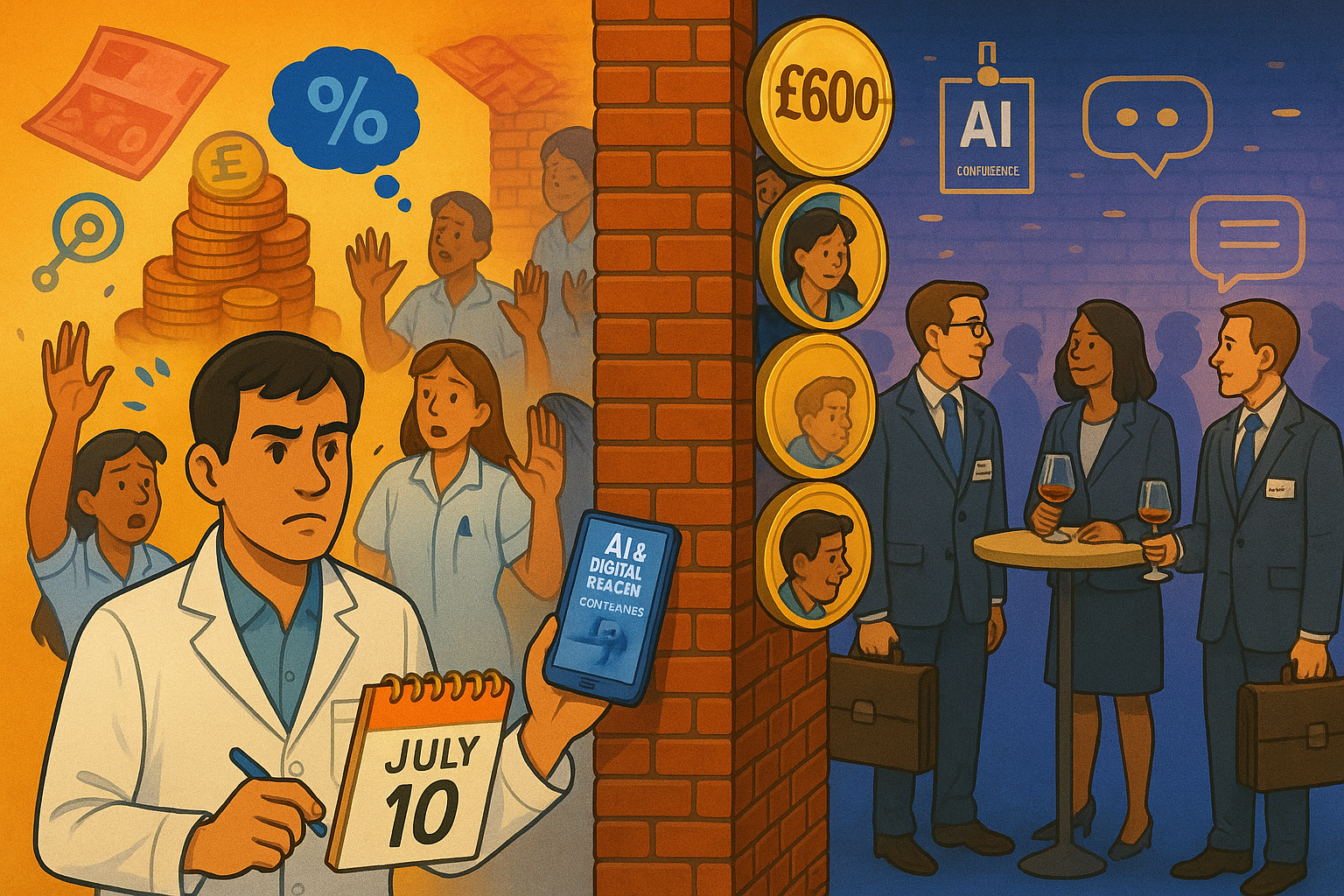I’m looking at my calendar, pen poised over Thursday, 10th July. The PM Healthcare Digital Technology & AI Conference at the Royal College of General Practitioners in London promises exactly the kind of insight I thrive on—digital health and AI from a pharmacist’s perspective. A colleague is presenting, the agenda looks compelling, and I know it’ll be valuable.
Yet, my pen stays still. The 10th of July isn’t just another conference day—it’s a £600+ decision.
Annual leave or lost pay, travel costs to London, meals, and the hidden price of spending a full day away from work all add up quickly. This dilemma is all too familiar to healthcare professionals like myself, passionate about innovation but constrained by practical realities.
The Paradox of Professional Development
There’s an irony at play here. As AI reshapes healthcare, frontline professionals—pharmacists, pharmacy technicians, nurses—are increasingly priced out of crucial discussions. These are the very people who will directly implement and manage new technologies, yet their voices are often excluded due to financial barriers.
My employer, like many within the NHS and community pharmacy, faces tight budgets. Professional development, especially around emerging technologies, often isn’t viewed as essential investment but rather as an optional luxury—a “nice to have” rather than a must-have. Yet, AI literacy is clearly vital for future-proofing pharmacy practice, improving clinical decision-making, and enhancing patient safety.
Virtual attendance offers a partial solution but rarely captures the full experience. Informal conversations during coffee breaks, impromptu Q\&A sessions, and networking opportunities—often as valuable as formal presentations—are lost online. Organisers face a dilemma too: invest too heavily in virtual offerings, and they risk losing physical attendance revenue; underinvest, and remote delegates receive a lesser experience.
The Rise of the Conference Elite
Equally concerning is the emergence of a “conference elite”—consultants, academics, and industry representatives who dominate these events. They have budgets, institutional backing, and flexibility to attend multiple conferences yearly, shaping the narrative around healthcare AI.
Yet, do they fully grasp what it’s like to manage a community pharmacy when the system crashes mid-morning? Or understand the reality for hospital pharmacists juggling complex medication reconciliation across multiple digital platforms? Their perspectives matter, but they must not be the only ones heard.
The Hidden Cost of Exclusion
Exclusion matters. Early-career pharmacists and pharmacy technicians—those who will integrate AI into their practices for decades to come—are often least able to afford entry to these critical conversations. Their fresh perspectives, practical insights, and potential challenges remain unheard due to financial barriers.
Without inclusive dialogue, there’s a real risk we develop AI solutions perfect for boardroom presentations but unsuitable for frontline realities. We might create sophisticated algorithms that stumble when confronted with real-world patient data or intuitive interfaces that confound busy healthcare staff during pressured shifts.
Towards Inclusive Innovation
Conferences remain essential, but their current model reinforces exclusivity, potentially undermining genuine innovation.
Professional bodies such as the Royal Pharmaceutical Society could provide targeted bursaries or sponsored attendance. Employers need to recognise that investing in staff knowledge of emerging technology isn’t optional but strategic preparation for an AI-driven healthcare future.
Event organisers should genuinely enhance hybrid experiences, incorporating meaningful virtual interactions such as interactive chat rooms, downloadable resources, live discussions from the audience, and post-event digital networking platforms.
Crucially, we must consciously amplify diverse voices in healthcare AI dialogues—practitioners from varied settings, career stages, and geographical locations. The people most affected by AI-driven changes need to be central in shaping these discussions, not just those able to afford to attend.
The Real Question
Staring at the £600 barrier, I realise it’s more symbolic than financial. It represents a systemic limitation influencing who shapes the future of healthcare technology.
The critical question isn’t whether I can afford to attend on 10th July. It’s whether we, collectively, can afford to continue shaping healthcare AI without inclusive representation from all who will experience its impact daily.
That’s a price we simply cannot afford.
Darren Powell


Leave a Reply to Monalisa Kapinga Cancel reply